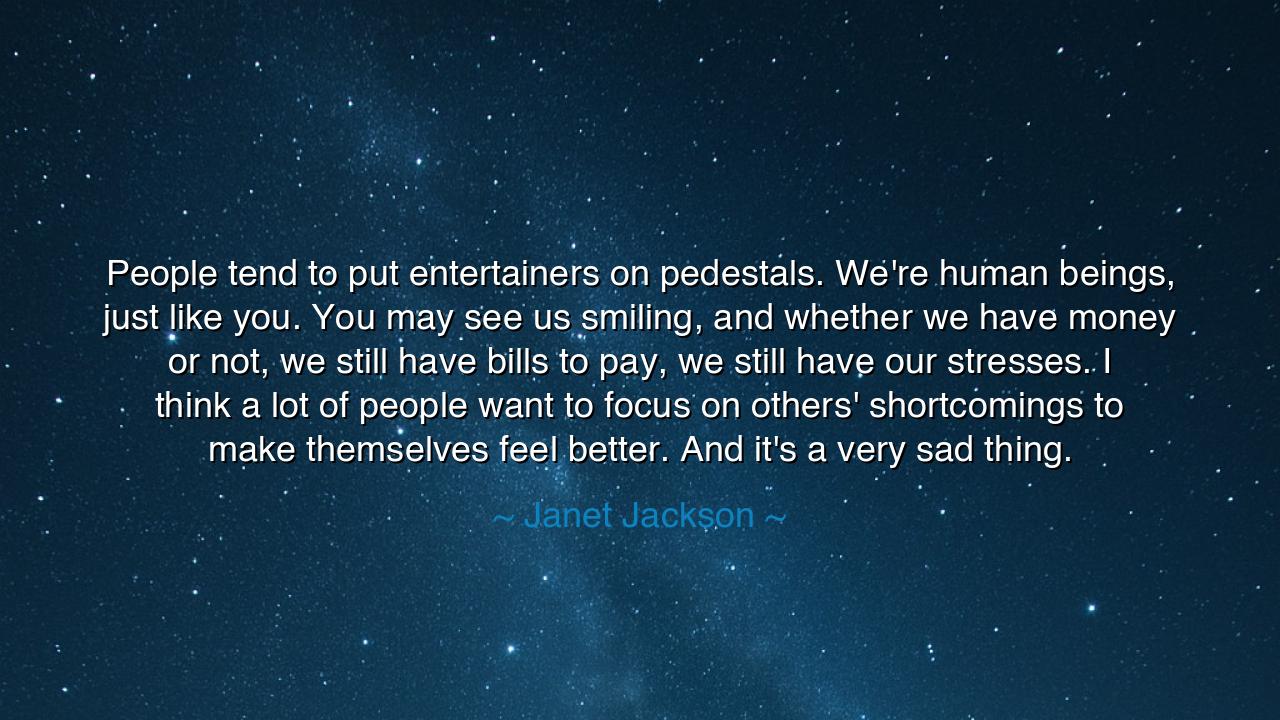
People tend to put entertainers on pedestals. We're human beings
People tend to put entertainers on pedestals. We're human beings, just like you. You may see us smiling, and whether we have money or not, we still have bills to pay, we still have our stresses. I think a lot of people want to focus on others' shortcomings to make themselves feel better. And it's a very sad thing.






Hear now, O listeners of truth and humility, the words of Janet Jackson, daughter of legacy yet seeker of humanity: “People tend to put entertainers on pedestals. We're human beings, just like you. You may see us smiling, and whether we have money or not, we still have bills to pay, we still have our stresses. I think a lot of people want to focus on others' shortcomings to make themselves feel better. And it's a very sad thing.”
In this reflection lies not the complaint of a star, but the wisdom of one who has walked among both worship and judgment, and has seen how easily society forgets that fame does not erase humanity. Her words are an appeal to compassion, a reminder that all beings—adored or anonymous—are bound by the same struggles of the spirit.
The origin of this quote lies in Janet Jackson’s life, a journey shadowed by both immense success and profound scrutiny. Born into the legendary Jackson family, she was surrounded from childhood by applause that was both a blessing and a burden. Through years of fame, she witnessed how the public built idols only to delight in their breaking. When she speaks of pedestals and sadness, it is with the voice of one who has lived the contradiction—the illusion of perfection forced upon imperfect beings. Her truth is not only personal but universal: every society creates its idols, and every idol eventually suffers under the weight of expectation.
This reflection reaches far beyond entertainment; it is a lesson as old as civilization. The ancients, too, fell to this folly. They sculpted gods in marble, yet feared their wrath when they revealed human flaws. Consider the tale of Alexander the Great, worshiped as divine in his time. When his temper and sorrow revealed his mortal heart, the same voices that praised him turned to judgment. So it is in every age: when we elevate others beyond humanity, we strip them of the right to be human. Janet’s words call us to humility—not only toward others, but toward ourselves, for the desire to judge often hides our own insecurity.
When she says, “We still have our stresses,” she unmasks a truth society often denies—that no wealth, fame, or fortune can shield the heart from pain. Every soul, no matter how celebrated, bears its unseen battles. The singer’s stress may differ from the worker’s, yet both stem from the same root—the struggle to find peace within a restless world. Her sadness arises from the knowledge that people find comfort not in compassion, but in comparison—that they seek strength not by lifting others, but by bringing them low.
There is also a profound moral insight here about empathy and projection. To “focus on others’ shortcomings,” as she says, is to seek escape from one’s own discontent. The ancients would call this the sickness of envy—the poison that corrodes both heart and community. In every era, those who shine too brightly attract shadows; yet it is not the fault of the light but of those who cannot bear its reflection. Her words remind us that true strength lies not in judgment, but in understanding—that to recognize another’s humanity is to heal a part of our own.
From her sorrow, we may draw a lesson for all generations: guard yourself from the temptation to worship or to scorn. The pedestal and the pit are two sides of the same illusion. Do not deify others, for you will one day despise them when they fail your fantasy. Instead, see in every person—artist, leader, stranger—the same breath of struggle and hope that moves within you. When you look upon greatness, honor the labor, not the mask. When you see weakness, honor the truth, not the shame.
And so, Janet Jackson’s words become a gentle command to live with compassion. Do not measure your worth by comparison, nor another’s by perfection. Remember that all who walk this earth—singers, saints, and sinners alike—share the same fragile heartbeat. To live wisely is to reject both idolatry and ridicule, and to embrace the sacred middle ground: the acceptance of shared humanity. For in that recognition lies the beginning of peace, both within ourselves and among one another.






AAdministratorAdministrator
Welcome, honored guests. Please leave a comment, we will respond soon